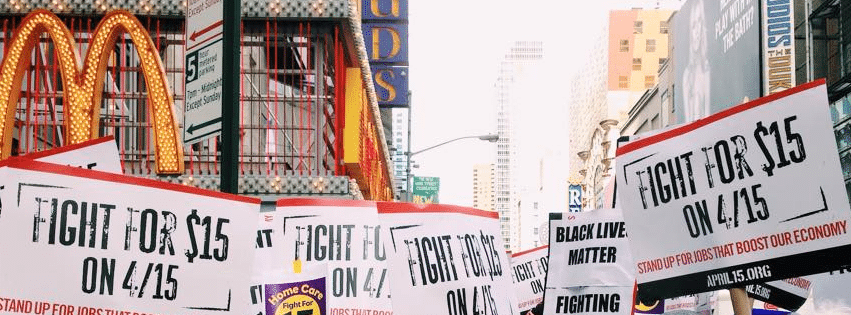Labor & Economy
Minimum Wage Protests Planned for April 15

As President Obama’s efforts to nudge the U.S. minimum wage from $7.25 to $10.10 an hour continue to be rebuffed by a Republican Congress, a national coalition of low-wage fast-food and retail workers will be taking their demands for a doubling of the current wage to the streets on Wednesday, in what they promise will be “the largest low-wage worker strike in history.”
Kendall Fells, the organizing director for the Fight for $15 campaign, said the April 15, 200-city walkout will also include actions on about 170 college campuses around the country and abroad.
Wednesday’s one-day strike is part of a three-year campaign spearheaded by the Service Employees International Union and the AFL-CIO to build public support for raising the pay for fast-food and other low-wage workers, a boost that would lift about 12 million Americans above the federal poverty line of $23,850 a year for a family of four.
The campaign has been credited with last November’s passage of San Francisco’s $15 minimum wage ballot measure, as well as Seattle’s pioneering $15 minimum wage ordinance that was signed into law last June.
Los Angeles, New York and Chicago all have similar measures under consideration. In L.A., the city council is looking at two competing boosts to California’s current $9 minimum wage — a plan forwarded by Mayor Eric Garcetti that would result in $13.25 per hour by 2017, and another championed by six councilmembers that would push the Garcetti wage to $15.25 by 2019. A vote is expected sometime before summer.
The April 15 Fight for $15 actions had been announced by organizers at a March rally in front of a McDonald’s in New York City’s Times Square. “McDonald’s needs to come to the table, because they could settle this issue,” Fells declared.
Fells added that home health care aides, airport workers, parttime college professors, child care workers and Walmart workers will be among those turning out on April 15.
McDonald’s, which as the nation’s largest employer of low-wage fast-food workers, has been the focus of much of the minimum wage effort, announced last month that it will raise hourly wages by at least $1 over the local legal minimum wage and offer new benefits to 90,000 employees in the U.S. outlets it owns and operates.
That raise, which on average will net McDonald’s workers around $10 in 2016, won’t apply to the 750,000 employees who work at the corporation’s roughly 12,500 franchised restaurants around the country.
Deciding whether the company is responsible for its franchisees is at the center of a discrimination lawsuit and December complaints in which the National Labor Relations Board named McDonald’s Corp. as a “joint employer” of workers at its franchises. The NLRB’s general counsel’s office alleged that McDonald’s and certain franchisees violated rights of restaurant workers by making statements and taking actions against them for participating in the Fight for $15 campaign.
McDonald’s responded to the NLRB joint employer decision in a statement that condemned the finding, charging that the complaints “improperly and dramatically strike at the heart of the franchise system.”
In California, six major demonstrations around the state are scheduled for Wednesday.
In Northern California, demonstrators in separate morning actions at Fresno’s Manchester Mall, San Jose’s McDonald’s at 2680 Story Road and Sacramento’s Crocker Park will later converge by bus to Berkeley to join protesters there at the McDonald’s on the corner of University and Shattuck avenues.
In Southern California, Los Angeles university students and faculty will meet at 10:30 a.m. at Jefferson Boulevard and Hoover Street before joining low-wage workers in a march on the McDonald’s at Figueroa and W. 28th streets at 11 a.m. In San Diego, workers and students will gather at 4 p.m. on San Diego State University’s Scripps Cottage Lawn near Hepner Hall.

-

 The SlickJanuary 27, 2026
The SlickJanuary 27, 2026The One Big Beautiful Prediction: The Energy Transition Is Still Alive
-

 Column - State of InequalityJanuary 29, 2026
Column - State of InequalityJanuary 29, 2026Are California’s Billionaires Crying Wolf?
-

 Latest NewsFebruary 3, 2026
Latest NewsFebruary 3, 2026Amid the Violent Minnesota Raids, ICE Arrests Over 100 Refugees, Ships Many to Texas
-

 Dirty MoneyJanuary 30, 2026
Dirty MoneyJanuary 30, 2026Amid Climate Crisis, Insurers’ Increased Use of AI Raises Concern For Policyholders
-

 Featured VideoFebruary 4, 2026
Featured VideoFebruary 4, 2026Protesters Turn to Economic Disruption to Fight ICE
-

 The SlickFebruary 2, 2026
The SlickFebruary 2, 2026Colorado May Ask Big Oil to Leave Millions of Dollars in the Ground
-

 Column - State of InequalityFebruary 5, 2026
Column - State of InequalityFebruary 5, 2026Lawsuits Push Back on Trump’s Attack on Child Care
-

 Column - California UncoveredFebruary 6, 2026
Column - California UncoveredFebruary 6, 2026What It’s Like On the Front Line as Health Care Cuts Start to Hit

